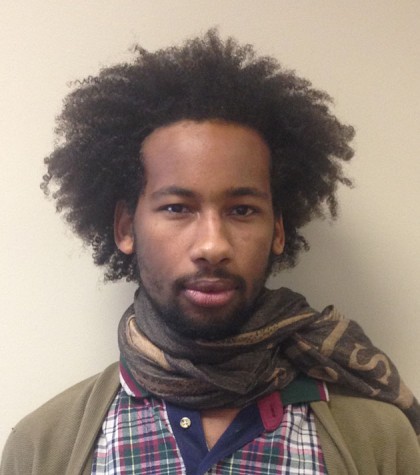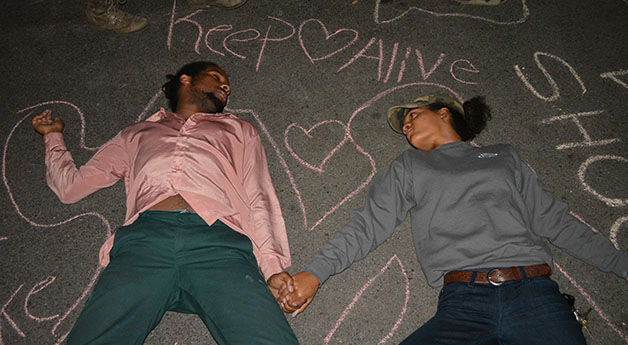Activism without concrete action is plain rhetoric
Mack Guillory (left), theatre arts sophomore, and another student participate in a die-in on Nov. 25, 2014. Loyola and Tulane students gathered and protested following the lack of an endictment in the Michael Brown case.
January 30, 2015

Theatre arts sophomore
White Lives Matter.
Sounds odd, right? In your lifetime, you will probably never hear this phrase spoken by protesters, mothers, students, political officials or a grieving family in the wake of their son’s death. “White Lives Matter” will never be the platform for a social movement because, quite frankly, it is so glaringly obvious in this country that white lives matter.
But “Black Lives Matter” is a different story entirely.
Never once did I think that I didn’t matter growing up. Never once did I think that because of my skin color someone could look at me, appraise me and tell me that I didn’t matter. No one ever told me I was expendable or disposable.
This is why the hashtag #Black Lives Matter makes me so sad.
I am unbelievably distraught by the fact that the average African-American is caught in the cross wires of judicial and penal systems that routinely execute its black populous.
Meanwhile, I am forever indebted to the messianic white middle class who “speak” for us.
Yeah, hashtag black people are people, too. Apparently, we are just ancillary bodies waiting to be disposed of at America’s whim in America’s burgeoning police state.
The infamous murders — and that’s what they are — of Michael Brown and Eric Garner are part of a larger historical trend of state violence against black men, youth and women.
Emmett Till, at the age of 14, was brutally murdered for flirting with a white woman in the 1950s. In the 1930s, the nine, teenaged Scottsboro Boys were falsely accused of raping a white woman and were wrongfully imprisoned or shot. Fast-forward to the 21st century — we have witnessed the contemporary murders of Trayvon Martin, Michael Brown and Eric Garner, not to mention the ones that have escaped the watchful eye of the corporate news media.
But things in this country are beginning to change. Blacks and whites and people from across the color wheel are joining together to hold boogeymen like Officer Darren Wilson and Officer Daniel Pantaleo accountable.
People are tired of police brutality, economic exploitation, radicalized violence and they are mobilizing.
I remember watching protests on CNN during the height of the riots after Daren Wilson’s acquittal, wishing I was there. I could see the hashtags scrolling across the screen.
Reductionist activism is a large part of the problem when it comes to getting involved in a larger social struggle. We reduce our identities to what can be easily marketed and digested. We post about social issues because it’s a proclamation that I too believe or stand for or against issue “X.”
But that’s easy, transient and ultimately ineffective. Social media activism just fuels trendy activism, which carves out a comfortable, safe niche for the middle class to inhabit. The hashtag is merely self-gratifying if it isn’t coupled with real, substantive action.
You may ask yourself — well, then what do I do?
First, get involved. But get involved in some real way. Although I have qualms with chanting a man’s dying words, the protestors chanting “I can’t breathe” are actually doing something.
A wise professor once told me, “Act justly, love tenderly and walk humbly”, when I was at a crossroads with activists. I really believe in community solidarity and going beyond your comfort zone, just as I believe in standing on the side of the marginalized and oppressed, but I don’t believe in advocacy for the sake of acting as a social justice warrior so you can post a blog about how righteous you are.
I believe in advocating for activism because you love people.
There are a myriad of organizations and campaigns happening in and around New Orleans. Take advantage of them. Go beyond your computers. Touch someone.
Because, you — yes, you private liberal arts student — can breathe. Use your gift. Find a way to give your time, heart and body.







